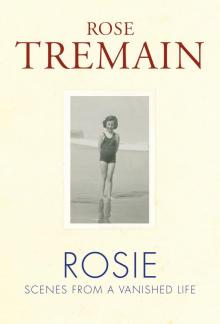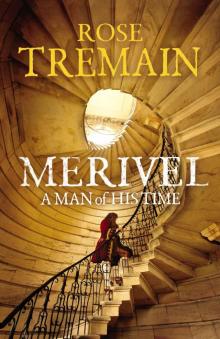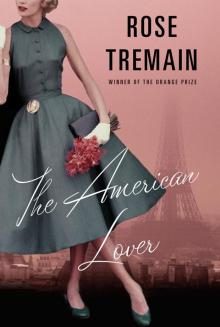- Home
- Rose Tremain
The Road Home Page 20
The Road Home Read online
Page 20
Lev knew that her success at GK Ashe played a part in her mood. The trial week had gone smoothly. Sophie was a sous-chef now, on seventeen pounds an hour. Already, she told Lev, she could imagine opening her own restaurant one day, “and this,” she said, “would be the most brilliant life I can think of. Be my own boss. Design my own menus. Somewhere less high-end than GK Ashe. More buzzy, less expensive: food for people who want to eat well and have a good time and not take out a fucking bank loan to pay for it.”
“Where will it be?” Lev asked.
“Dunno. North London somewhere, I guess. Except every second shop is turning into a food outlet these days. Banks are morphing into pizza emporia. I saw a funeral parlor that had become a tapas bar. What premises are left?”
They lay in the dark, swapping their private dreams. Lev said that his ambition, now, was to learn to be a chef, too. He said that he’d spent forty-two years not thinking about food. Now he thought about it for hours at a time. All through his vegetable prep, he kept watch on what G.K. and Sophie and Pierre were making. He made notes on a pad he kept in a pocket of his whites.
With the fine weather, Christy Slane began thinking about the day out with Frankie. He said he was coming round to the idea of going to Silverstrand. “The only thing we have to do,” he told Lev, “is get you vetted by Angela. She’ll never let Frankie go anywhere with people she’s never seen.”
So Lev and Sophie were sitting now in the front room of the flat in Belisha Road, waiting for Angela to show up. It was midmorning and Christy had set out the coffee-making equipment in a meticulous line on the kitchen worktop. He said, “I was going to buy some pastries, but I thought better of it. When you offer Angela something, she never bloody well wants it. She only wants it when you’re way past offering it anymore.”
“I wouldn’t have minded a pastry,” said Sophie.
“Oh, right you are. Shall I go and get some, after all, then?”
“Nah. I’m fine. But you know this vetting’s a farce, Christy. It’s like parents’ day at school.”
“I know. I know it is, but what can I do?”
Angela came in, wearing a smart red coat. She was tall and big, with wide hips and a tall woman’s lofty smile. Beside Christy, she looked huge. Her eyes were brown and slightly protruding.
Lev stood up and kissed her hand. He could tell by her embarrassed smile that she thought this ridiculous, yet found herself girlishly flattered by it.
Sophie said, “Hi, Angela. I’m Sophie. I work with Lev at GK Ashe. I live in Kentish Town. I’m twenty-nine and I have no children.”
“It’s not an interrogation,” said Angela.
“Oh, right,” said Sophie. “I thought it was.”
Lev caught Christy’s stricken look. “Angela,” Lev said quickly, “Sophie is just saying . . . we tell you anything you want to know. Who we are. Everything. Then you will be happy.”
Angela looked round at the three of them. It was a look that asked, Is everybody in this room mocking me? and Lev saw her turn, as though starting for the door. But Christy jumped to her side. “Take your coat, love? Come and sit down. Put the gas fire on if you’re cold.”
Silently, slowly, Angela surrendered her coat, which Christy went to hang up in the entrance hall. He called out that he was now making the coffee.
Angela stared at Lev and Sophie. Lev noticed that, in contrast to Christy’s suffering face, Angela’s skin was flawless, like the skin of Diana, Princess of Wales. Yet he also saw a woman whose youth was disappearing and who knew that this was so.
“Well . . .” she said.
She looked around, not knowing where to sit, as though she’d forgotten that she’d taken away most of the furniture from this flat.
Lev offered her his chair, and he went to stand by the window, where the winter sunlight put a gray sheen on the dusty net curtains.
Sophie said, “So, do you know Silverstrand, Angela?”
“Yes,” said Angela. “Of course I do. I was born there.”
“Oh, right. Christy didn’t tell us that.”
“Well, Silverstrand’s not much to write home about. The sea’s nearly always gray and full of muck. I was glad when my parents moved.”
“Kids love the water, though,” said Sophie. “I did. We used to go to Hove. Put up our stripy windbreak . . .”
“How would you get to Silverstrand? I’m not letting Frankie go in a car with Christy driving.”
“Train,” said Sophie. “Change at Ipswich. Only about an hour and a half. And we’ve been saving up for cotton candy, haven’t we, Lev?”
“Yes. Because I never tried that. I am like a child . . .”
Angela shifted position, so that she was facing Lev. Under the red coat she was wearing a woolen dress, and she kept pulling the hem of the dress down, to try to cover her fleshy knees.
“Coffee almost ready!” called Christy, and Lev could hear the panic in his voice.
Lev found his wallet, took out his picture of Maya, walked over to Angela, and offered it to her. “My daughter,” he said. “In my country. Maya. Age five.”
Angela took the photograph and gazed at it blankly for a moment, then handed it back. “I hope you’re sending money home,” she said with a sniff.
“Yes,” said Lev.
“Lev’s had lots of practice with children,” offered Sophie.
“Practice?” said Angela. “That’s a funny word to use.”
“Why?”
“As if caring for a child was like riding a bicycle. It’s knowing how to behave in your own life that matters.”
Christy appeared, carrying the coffee tray. His hands shook and Lev could hear the mugs rattling. “Everybody okay?” he said.
Lev went to his side. “Christy,” he said, “I pour the coffee. Chef’s technique.”
“Thanks, fella,” said Christy. Then he babbled, “I was going to get pastries, Angie . . . but I thought you might not . . .”
“Thought I was big enough? Quite right. Tony keeps telling me I’m too big. But then he goes on taking me out for meals: expensive meals, too. I keep saying, ‘Tony, I thought you wanted me thinner, and now look, more champagne, more lovely sauces. How am I to lose weight with all this?’ ”
“Who’s Tony?” asked Sophie bluntly.
Angela turned to face her. “Tony?” she said. “Well, not that it’s any of your business, but Tony is my partner.”
“Right.”
“He’s in real estate.”
“Is he? Oh, how lovely.”
Lev could hear a laugh beginning to surface in Sophie’s voice. And he felt the moment sliding toward catastrophe. He took the coffee quickly to Angela and knelt down by her chair.
“Angela,” he said, “I am lodger with Christy for many months now. Hardly ever does he drink anymore. I swear this. But he is, like me, so sad for his daughter, so sad for Frankie . . .”
“He doesn’t need to be sad for Frankie. He needs to be sad for himself.”
“This I mean. I’m sorry my English is not good. I mean that Frankie is missing . . . he is missing her so much.”
“He may say that now, but what does he do when we all lived here? Just fucks off out all the time—not to work, hardly ever to work. Fucks off to the pub. She kept asking me, ‘Where’s my dad?’ And what was I supposed to say? Then he comes home and throws up in the hall. It was an absolute bloody fucking nightmare!”
“But now . . . almost never the pub . . . almost never.”
“So you say.”
“It’s true, love,” said Christy. “I know I was bad for a long time. But I’ve got a real grip on it.”
“He has,” said Lev. “A very good grip. So all we’re asking is, please let us make a nice day for Frankie. All together. By nighttime she is back with you. Everything nice and safe: walk on beach, play kiddie golf, eat fish and chips. Everything lovely, like that.”
Angela put sugar into her coffee and stirred it vigorously. “I’m not deciding now,” she said, �
�so don’t pressure me.”
The room went silent. Lev got up from his knees. He took out a packet of Silk Cut. “Will it trouble you if I have cigarette?” he asked Angela.
“Suit yourself,” said Angela. “It’s not my flat.”
Lev offered the packet of cigarettes to Christy, and he took one with a trembling hand.
“What Lev says is true, Angie . . .” he began.
“Oh, leave it out, Christy!” she shouted, slamming down her coffee mug. “This whole charade pisses me off, well and fucking truly! You make my life a misery for five years and now you want to pretend it’s all going to be okay, all fucking fine and dandy. Well, it’s not! You’ve got to do more than bleat on about not going to the pub. You’ve got to do more than live off the rent of innocent people from a foreign country. You’ve got to start working again. You’ve got to prove—not just to me, but to the courts—that you’re a rational, responsible human being again and a fit father. Then I might consider what you’re asking. Meanwhile—and I want to tell you this now, so your new friends can restrain you when you throw some Irish epileptic fit— Tony has asked me to marry him, and as soon as the divorce is through, that is what I’m going to do. I’ve told Frankie and she’s fine with it. She adores Tony. He’s becoming the father she never had.”
Christy sat down on a hard chair. His blue eyes blinked and blinked. This blinking reminded Lev of the terrified beating of an insect’s wing.
Sophie said quietly, “I’m not from a foreign country. My parents live in Sussex. They breed lurchers.”
Angela got up. She hadn’t touched her coffee. She turned to Sophie and said, “I don’t care who you are or where you live, dear. You’re not part of this. This is between me and Christy. But if you want to be his friend, tell him to stop pestering me about seeing his daughter. He should have thought about all that long ago.”
“Angela . . .” Christy began.
“I’m not listening!” she said. “I don’t know why I even agreed to come here. I only agreed because Frankie wants her shop, so I’m going to get that now and then I’m leaving.”
Angela stomped out of the room. Lev turned to Christy, who didn’t move. The cigarette had fallen out of his thin, burned hands, which he clasped and unclasped under his chin. Lev went over to him and picked up the cigarette and lit it and gave it to him. Sophie looked at Lev for guidance, and Lev made a decision.
He turned and left the room, and walked along the corridor to his own door. The sight of Angela, large and angry in his bedroom, offended him. He saw her bend down and pick up the miniature shop, with its old-fashioned commodities and its little optimistic sign, HI! MY STORE IS OPEN. He watched the mustachioed storekeeper fall out and bounce onto the floor.
“Oh bugger!” said Angela.
Lev picked up the storekeeper. Angela said, “I need a carrier bag, or something, to put this lot in. Can you find me one?”
“It’s a shame . . .” said Lev.
“Eh?”
“I’m thinking . . . I am quite fond of this store assistant. I will miss this shop.”
“What?”
“True. I will miss. But it’s okay. This is nothing. But if you take away Frankie from Christy, this is bad. He is the father, as I am father of Maya. He will suffer . . .”
“Listen,” said Angela, with a heavy sigh. “You seem like a perfectly nice man. I hope England treats you fairly. But just don’t meddle with things you don’t know anything about, right? Christy Slane is not going to be allowed to ruin my life, or my daughter’s, and that’s all I have to say. That’s it. Finito. So could you just get me a carrier bag and I’ll be on my way?”
Lev handed her the storekeeper and she threw him into the door of the shop.
“I have no carrier bag,” he said.
“Oh, never mind!” said Angela. She walked to the hallway, grabbed her red coat from the peg, and, carrying the shop awkwardly under her arm, let herself out of the flat. Her heavy footsteps clumped down the stairs.
Lev told Sophie he’d have to stay at Belisha Road for a while, to keep Christy company, to try to stop him going to the pub.
“You’re at work half the night,” she said, “so what difference can that make?”
“Maybe some. If he knows I will be back . . . if we make breakfast in the mornings . . .”
“You’re naive, Lev. If someone wants to drink his life away . . .”
“I know,” said Lev. “But I can try this. Christy has been my good friend.”
They were at GK Ashe, at the end of a long, busy night. Sophie turned away from Lev and said, “Okay. Fine. You stay at Belisha Road. I’ve got stuff to do, anyway.”
“What ‘stuff’?”
“Same stuff as you: taking care of my friends.”
“But some nights you could come there. To my room . . .”
“What? Screw in a kid’s bunk? I can’t, Lev. It’s too totally bizarre.”
On the other side of the kitchen, Vitas was toiling over his sinks and drainers. That same night G.K. had said to him, “You’re hanging by a thread, Vitas. Today I found gobs of goat’s cheese still stuck to my salamander; I found a smear of blood on the floor.”
“Not blood, Chef.”
“And don’t argue with me. Just never do it. You’ve got till the end of the week to get your ducks in a line, or you’ll be out. You’ll be picking sprouts in fucking Lincolnshire.”
Later, when G.K. and Sophie had gone, Vitas said to Lev, “What is Lincolnshire?”
“Oh,” said Lev, “it’s the countryside somewhere.”
“I’d rather be there than here, then,” said Vitas. “I miss trees.”
The idea of the dam had washed against Lev’s heart, like silt. In his dreams he’d seen the schoolhouse in Auror floating on the water like a wooden boat, then slowly sinking, and, for a moment, he’d thought this vision of the slowly sinking schoolhouse oddly beautiful—until he realized that all the children, including Maya, were still inside it. Far off, on the water, he could hear them screaming.
He told Christy about the dam. Christy said he had to light a fag and make a cup of tea before he could bear to think about it. Then, with the cigarette and the strong tea in his hand, he said, “Public Works, Lev. You know, the very term terrifies me to the gills. Because you can never imagine anything good coming out of there. It’s meant to sound philanthropic, but what it signifies to me is some consortium of strangers replacing a thing you love with a thing you don’t need.”
Christy’s hand shook as he drank the tea, but he was holding himself together. The thing that seemed to be holding him together was a 1,000-piece jigsaw puzzle of Van Gogh’s Sunflowers. He’d spread it over the table and he worked on it for hours and hours at a time, drinking tea and smoking. At the end of the conversation about the dam at Auror, he said, “The thing we’ve got to try not to lose is our reason. We mustn’t end up like this fella Vincent.”
Lev put off calling Rudi, in case the news from Auror was bad. Then, one Sunday morning, he felt he couldn’t put it off any longer and dialed the familiar number.
“Tchevi’s fixed!” Rudi announced triumphantly. “Now I suddenly love Germans. I kiss their arses. They make belts that fit.”
“She doesn’t creep anymore?”
“No. It’s like she’s been to dog-training school, come back a different animal! All I gotta do now is punch out the dents in the fenders and polish up the chrome. Then she’s good as new.”
Relief about the Tchevi seemed to have made Rudi impervious to any other misfortune. When the subject of the dam came up, he still sounded blithe. “Okay,” he said. “Lora got to see someone in Public Works. Not that bastard Rivas. Some thin creep with a squint. Dunno his rank. It’s possible it was low.”
“Tell me what he said.”
“Usual department crap. But I think it’s okay. He said a dam above Baryn had been a ‘provisional project’ for something like two years.”
“But nobody’s known about it?”
“I guess some people know. But Squinty told Lora there were no plans to actuate it. ‘Actuate,’ eh? That’s a typical Rivas word, isn’t it?”
“No immediate plans, or no plans ever?”
“You know Public Works, comrade. They don’t deal in concepts like ‘ever’ and ‘never.’ Everything’s provisional. I think there’s probably this team of celestial engineers going round designing dams and hydroelectric plants and reservoirs on every fucking river in the country, and they all coo over their drawings and imagine the prosperity these projects are going to bring and the rewards they’re going to get—and then nothing happens because there’s no money from Central Government. So there you are. I guess Auror’s pretty safe.”
Lev wanted to feel reassured by what Rudi had told him, but he sensed that the information was inadequate and this maddened him. He felt sure that if Marina had been alive, she would have ferreted out the truth. But now they were like everybody else—isolated by distance, at the mercy of a bureaucracy in which lying was still the chosen mode of communication.
“You’ve got to keep watch, Rudi,” said Lev, after a moment. “Watch for surveyors. If a survey team arrives, that’ll be the first sign.”
“Not necessarily. You know what those dozy government departments are like. They dispatch a few men with clipboards. They trudge up and down. They look important, so everybody starts panicking, but all they’re doing is measuring the length of their own dicks!”
Rudi laughed his habitual explosive and infectious laugh, but on this occasion Lev didn’t join in.
“Okay,” he said, “but if rumors about a dam at Baryn have got as far as the villages around Jor, then someone knows it’s going to happen. They know.”
Rudi’s laughter died and Lev heard him coughing.
“Well,” he said, “what more can we do? You tell me. ‘No plans to actuate’ means what it says, no? Unless Squinty was bullshitting.”
“There were ‘no plans to actuate’ the closure of the lumber yard.”
“That’s different. They ran out of fucking trees!”

 Rosie
Rosie The Garden of the Villa Mollini
The Garden of the Villa Mollini Merivel: A Man of His Time
Merivel: A Man of His Time The Darkness of Wallis Simpson
The Darkness of Wallis Simpson Earth
Earth Sacred Country
Sacred Country The Swimming Pool Season
The Swimming Pool Season The Gustav Sonata
The Gustav Sonata Sadler's Birthday
Sadler's Birthday The Cupboard
The Cupboard The American Lover
The American Lover Letter to Sister Benedicta
Letter to Sister Benedicta Evangelista's Fan
Evangelista's Fan Restoration
Restoration The Road Home
The Road Home The Colonel's Daughter
The Colonel's Daughter The Way I Found Her
The Way I Found Her Music & Silence
Music & Silence